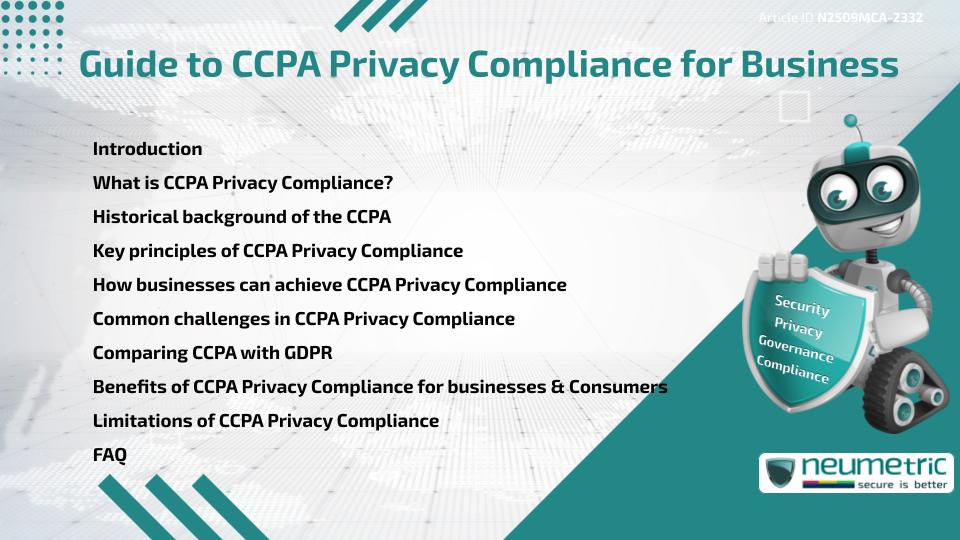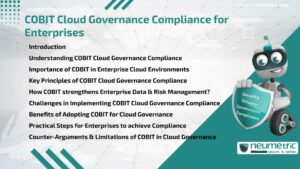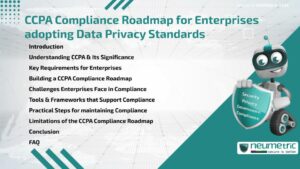Table of Contents
ToggleIntroduction
CCPA Privacy Compliance is essential for businesses that handle the Personal Information of California Residents. The California Consumer Privacy Act [CCPA] is one of the most significant Privacy laws in the United States, giving Consumers greater control over their Personal Data. Businesses must comply with requirements such as transparency in data collection, providing opt-out options & ensuring proper Security Measures. This guide explains what CCPA Privacy Compliance means, its historical background, its key principles, the challenges businesses face & how it compares with the General Data Protection Regulation [GDPR]. Understanding these factors can help businesses protect consumer trust, avoid penalties & create stronger data practices.
What is CCPA Privacy Compliance?
CCPA Privacy Compliance refers to the Processes, Policies & Safeguards that businesses implement to align with the California Consumer Privacy Act. It requires Organisations to inform Consumers about the type of data collected, the purpose behind its collection & with whom it is shared. Consumers have rights to request deletion of their data, opt-out of data selling & access the details of collected information. For a business, meeting these obligations means building transparent practices & adopting robust data Governance.
Historical background of the CCPA
The California Consumer Privacy Act was passed in 2018 & became enforceable in 2020. It was created in response to growing public concerns about how companies collect & sell Personal Data. This law reflects a major shift in consumer rights, establishing California as a leader in Privacy protections in the United States. Its roots can be traced to increased data breaches & high-profile incidents that highlighted the Risks of unregulated data use.
Key principles of CCPA Privacy Compliance
There are several Core Principles that define CCPA Privacy Compliance:
- Transparency: Businesses must provide clear notices regarding data practices.
- Consumer control: Individuals have the right to know, delete or opt-out of data sales.
- Non-discrimination: Companies cannot treat Consumers unfairly if they exercise their rights.
- Security: Reasonable measures must be in place to protect Personal Information.
These principles serve as a foundation for responsible Data Management.
How businesses can achieve CCPA Privacy Compliance
Businesses can achieve compliance by following structured steps:
- Data mapping: Identifying what Personal Data is collected & where it is stored.
- Policy updates: Revising Privacy notices to meet CCPA requirements.
- Training staff: Ensuring Employees understand Consumer Rights & data handling rules.
- Setting up opt-out mechanisms: Providing simple ways for Consumers to decline data selling.
- Responding to consumer requests: Establishing efficient processes to honour access or deletion requests.
Common challenges in CCPA Privacy Compliance
Businesses often face difficulties such as:
- Complexity in identifying all data flows.
- High costs associated with system updates.
- Balancing compliance with User experience.
- Managing Third Party Vendors who process Consumer Data.
These challenges make ongoing compliance a continuous effort rather than a one-time adjustment.
Comparing CCPA with GDPR
While CCPA Privacy Compliance is often compared to GDPR, there are important differences. GDPR, which applies across the European Union, requires businesses to obtain explicit consent for data collection. CCPA focuses more on providing opt-out rights rather than upfront consent. Another distinction is the definition of Personal Data: GDPR’s scope is broader, covering more categories of information. Despite these differences, both laws highlight the growing demand for stronger consumer Privacy.
Benefits of CCPA Privacy Compliance for businesses & Consumers
Compliance is not only about avoiding penalties. For businesses, it strengthens brand reputation & builds trust with Consumers. Consumers benefit by gaining more transparency & control over their Personal Information. Businesses that adopt strong compliance frameworks often find themselves better prepared for other regulatory requirements, creating a competitive advantage.
Limitations of CCPA Privacy Compliance
While CCPA sets a strong Privacy standard, it has limitations. The law applies primarily to California residents, leaving gaps in coverage for other states. Some critics argue that it does not go far enough in protecting Sensitive Data compared to GDPR. Additionally, smaller businesses may find the Compliance Requirements disproportionately burdensome.
Takeaways
- CCPA Privacy Compliance ensures transparency, consumer control & Data Security.
- Achieving compliance requires structured steps like data mapping & Employee Training.
- Businesses benefit from compliance through improved trust & readiness for other regulations.
- While effective, the CCPA has certain limitations compared to broader Global Standards.
FAQ
What is CCPA Privacy Compliance?
It is the process of aligning a business’s data practices with the California Consumer Privacy Act, ensuring transparency & consumer rights.
Who needs to follow CCPA Privacy Compliance?
Any business that handles the Personal Information of California Residents & meets revenue or data processing thresholds must comply.
What rights do Consumers have under CCPA?
Consumers can request data access, deletion & opt-out of their Personal Information being sold.
How is CCPA different from GDPR?
CCPA focuses on opt-out rights, while GDPR emphasizes explicit consent before data collection.
What happens if a business fails CCPA Privacy Compliance?
Non-compliance can result in Financial penalties & lawsuits, as well as reputational damage.
Does CCPA apply to Small Businesses?
It primarily applies to businesses that meet certain size or data volume thresholds, so very Small Businesses may be exempt.
What are the penalties for CCPA violations?
Penalties can include fines per violation & businesses may also face legal action from Consumers.
References
Need help for Security, Privacy, Governance & VAPT?
Neumetric provides organisations the necessary help to achieve their Cybersecurity, Compliance, Governance, Privacy, Certifications & Pentesting needs.
Organisations & Businesses, specifically those which provide SaaS & AI Solutions in the Fintech, BFSI & other regulated sectors, usually need a Cybersecurity Partner for meeting & maintaining the ongoing Security & Privacy needs & requirements of their Enterprise Clients & Privacy conscious Customers.
SOC 2, ISO 27001, ISO 42001, NIST, HIPAA, HECVAT, EU GDPR are some of the Frameworks that are served by Fusion – a SaaS, multimodular, multitenant, centralised, automated, Cybersecurity & Compliance Management system.
Neumetric also provides Expert Services for technical security which covers VAPT for Web Applications, APIs, iOS & Android Mobile Apps, Security Testing for AWS & other Cloud Environments & Cloud Infrastructure & other similar scopes.
Reach out to us by Email or filling out the Contact Form…





